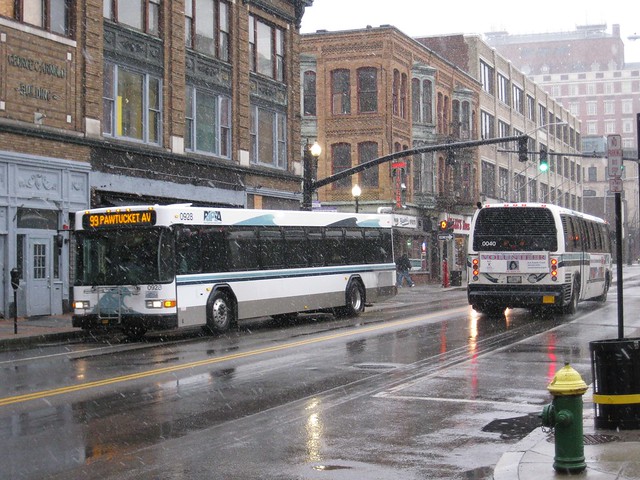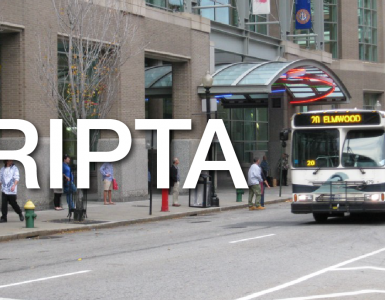Greater City: Providence reader Peter Brassard attended RIPTA’s 5-year plan community meeting yesterday. Here are is what he learned.
The Coalition for Transportation Choices (CTC) and the Transit 2020 Action Committee hosted Tuesday’s Community Briefing for RIPTA’s 5-year Strategic Plan at URI’s Janice Paff Auditorium in Providence.
Mark Therrien, RIPTA Assistant General Manager explained that RIPTA’s philosophy has made a major shift from a “last choice transportation” option the predominant view through the 1980s to become a “business transportation” system through the 1990s to the current philosophy of a provider of “multi-modal, convenient, and attractive” transit system that would “promote economic growth, and support thriving, livable communities.”
RIPTA sees itself as a “mobility manager.” Goals include increasing ridership, addressing demographic changes of system users, developing new modes, such as Flex Service that has been introduced to some suburban areas, which differs from fixed route service by offering individual direct pick-up and drop-off for passengers. RIPTA should be used as a tool to assist in economic development for “people going to work.” The five-year plan will work towards changing RIPTA’s image by improving information and service.
Development of a multi-modal, regional transit system is a priority. Intermodal connections can be improved by providing direct bus connections to train stations and reinforce connections to other modes such as bicycle, cars, and private buses. To support regional mobility, attempts will be made to have federal restrictions removed, which prevent RIPTA from crossing state lines. Another priority is to effectively address the needs of individuals with disabilities and the growing senior population. RIPTA wants to become the definitive transportation manager for Rhode Island.
Other goals include expanding Rhode Island’s transit network to accommodate growth by strengthening the statewide transit planning effort. Developing Downtown sub-transit hubs and reinventing Kennedy Plaza is another objective. Transit hubs also will be developed in other locations, such as Warwick Mall. RIPTA will coordinate providing handicapped taxicabs, which was requested by the hotel industry. Rapid Bus, an urban form of Bus Rapid Transit (BRT), will be initiated along the 11/99 route from Cranston through Providence to Downtown Pawtucket. This service should be launched by next spring. Other Rapid Bus lines are envisioned. It’s planned to increase statewide Park-and-Ride capacity and to strengthen Flex Service and focus rural transit on activity centers. Planning for building a streetcar or other transit investment in Downtown Providence is ongoing with the Core Connector Study. The next public meeting for the Core Connector will be on December 9th. A common complaint by people, who would otherwise use transit, is that they often will have daytime meetings that require driving to get to, which prevents them from utilizing transit. To alleviate this problem soon Zipcar service will be introduced to Downtown Providence [ed. note, Zipcar is here]. Zipcars are a car sharing club service where vehicles can be used for a fee by the hour or day. A Bus Stop improvement program will target 100 high-use stops to make route, schedules and fare information easier to find.
Amy Pettine, RIPTA Planning Special Project Manager explained that improving customer service is a key component of the plan. “Trans-Art” bus shelters are being built, which are designed by artists. A few examples are located in Providence and Central Falls. Better methods for distribution of transit information are proposed. Fares will be able to be paid for on-line. Bus stop improvements specifically data driven is envisioned. By the end of 2011 an Intelligent Transit System (ITS) will be in effect, which utilizes GPS technology to provide real time schedule information, as well as, track buses to improve scheduling. Cell phone and texting service will be available. At larger transit hubs, such as Kennedy Plaza, there will be actual signage that will display real time information.
There is recognition at RIPTA to support livable communities and the Green Economy. An example is the Eco-Pass program for businesses to contribute and encourage employee use of transit. RIPTA wants to discourage “off-grid” development for transit and when public projects are proposed in remote underdeveloped regions, RIPTA will point out during reviews the limitations of these lower density areas. The objective is to concentrate transit where higher densities exist.
The plan will identify a funding strategy for sustainable growth of the transit system. Beyond the crisis mentality of the past, RIPTA along with advocacy groups will petition the General Assembly for sustainable funding that’s less dependent on the gas tax. The Partnership for Sustainable Communities has brought money to the state for transit. 60% of RIPTA’s 5-year transit plan is funded. The remaining unfunded 40% includes projects like Downtown transit sub-hubs. RIPTA hopes to “create a ground swell of support” for transit to assist in securing sustainable funding.
A joint initiative by RIPTA and RIDOT will conduct a statewide rail planning study. Previously individual cities or towns would commission their own studies, which would duplicate efforts without providing a coordinated regional vision. RIPTA is presently conducting an Aquidneck Island transit study, which may partly be expanded to include the three Bristol County towns. It was discovered that people were specifically moving to Barrington, Warren, and Bristol because the towns have reliable and frequent bus service to Providence and Newport. RIPTA may begin looking at creating a similar transit corridor on the west bay.
Many of the public comments expanded on points made in the presentation. Some specific comments suggested developing a RIPTA marketing department that could help the public better understand changes in RIPTA services and to perhaps reintroduce fare zones, especially as fares might pertain to the Downtown Core Connector. There were specific recommendations about bus routes on the East Side and in Lincoln and a suggestion to develop special express bus service to distant suburban areas. There were several complaints about uncoordinated enforcement of snow clearing rules at bus stops, which are often under the jurisdiction of local municipalities or other state agencies. Several people were concerned with proposals to dismantle and redistribute bus stop locations with the proposed redevelopment of the Kennedy Plaza hub without considering distance of transfers between bus lines and mentioned that when these concerns were raised the Kennedy Plaza design group tended to ignore the issue.
The audience positively received RIPTA’s Community Briefing presentation for the 5-year Strategic Plan. The audience made constructive comments and both Mark Therrien and Amy Pettine were genuinely interested in incorporating the public views into their report. The RIPTA team should be commended for their vision and hard work. RIPTA clearly is no longer the provider of last choice transportation, but has transcended to become a provider of multi-modal, convenient, and attractive transit that will promote economic growth, and support thriving, livable communities.





One of the biggest complaints I hear about RIPTA is the transfer issue where you have to go to Kennedy Plaza to get to anywhere in RI.
They need to include the rapidly developing commuter rail.
Another point of contention with me is the streetcar in Providence. The way I see it, the proposed line benefits Brown University pretty much exclusively. I like the BRT idea for the 11/99 route but it’s a bit nonsensical because the stops currently in use would pretty much make BRT useless.
Instead I’d like to see a streetcar line that runs from the north end over to the southwest via Broadway onto either Manton or Hartford. those are both HEAVILY traveled routes. They’re only bested by the 11/99 route.
Lovely, all of that, Had I been there, I would have also brought up the need for a fare card kiosk, in Kennedy Plaza at the very least, As it is, if you arrive without exact change after the attendants’ booth is closed, you have to go to 7-11 or Haven Bros. to break a larger bill, which often means buying a banana, pack of gum, or coffee that you may not really want. That may sound trivial, but when time is short or weather is severe, it can be aggravating.